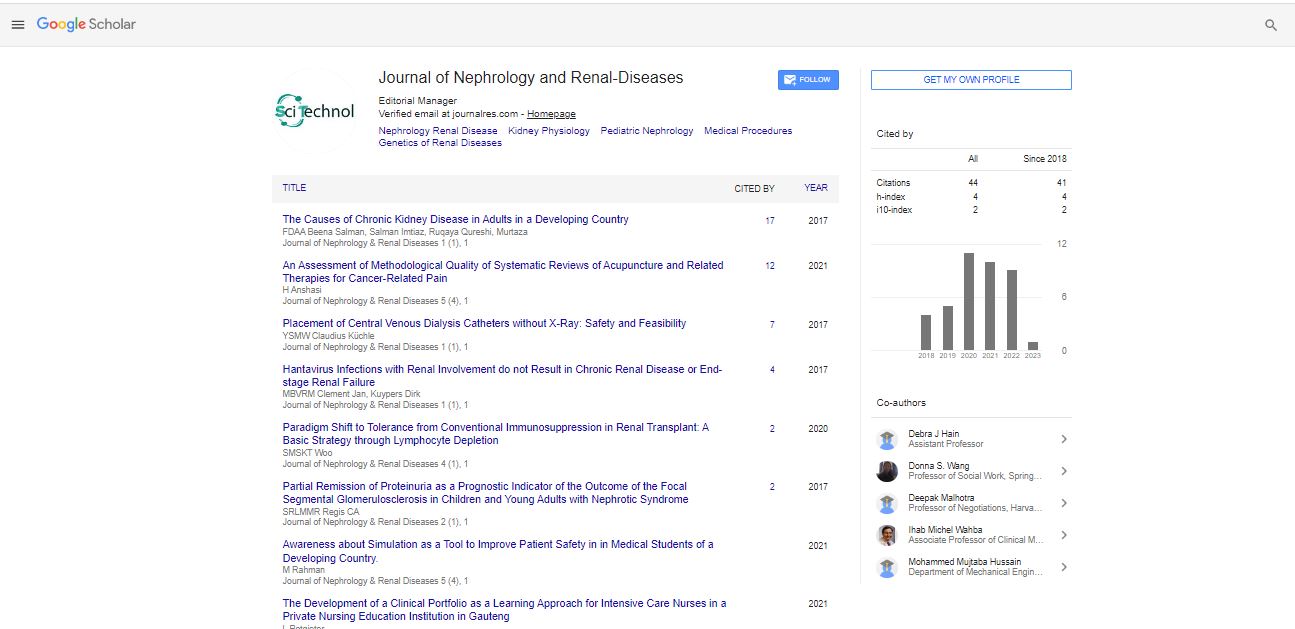Short Communication, J Nephrol Ren Dis Vol: 5 Issue: 4
The Development of a Clinical Portfolio as a Learning Approach for Intensive Care Nurses in a Private Nursing Education Institution in Gauteng
Lizelle Potgieter
Diploma in Medical Surgical Nursing Science University of the Witwatersrand.
Abstract
Clinical portfolios guide clinical learning experiences and assess
the student’s attainment of programme outcomes. The researcher
experienced that neither the student nor the educator utilised the
clinical portfolio effectively in the development and transformation
of the intensive care nursing student at the private nursing
education institution. The purpose of the study was to improve
the structure and enhance the use of clinical portfolios as a
learning approach in intensive care nursing education.The study
objectivesforthestudywas:
This study is a shortened intervention research with qualitative
methods for data collection from intensive care nursing students,
lecturers, clinical facilitators, and nursing education experts. A
content analysis(Tesch,1990)wasusedfordataanalysis.
The setting for this study was set in a private nursing education
institution in Gauteng that offers the intensive care programme.
Purposive sampling was used to select participants of the three
focus groups.
Students were not as concerned about the structure of the
clinical portfolio as they were concerned about how the portfolio
assists them in reaching their outcomes. Small changes
were recommended. Educators and the literature were more
concerned about the structure of the clinical portfolio and less
concernedabouttheprocessofapplication.
The clinical portfolio was redesigned to improve its function as a
learning approach and is ready for pilotinginlargersamplegroups.
Stage 1: to solicit the opinion of students and their educators on the
quality of the existing clinical portfolio and their recommendations
for the design and utilization of a revisedclinical portfolio;
Keywords: Nephrology & Renal Diseases
Clinical portfolios guide clinical learning experiences and assess the student’s attainment of programme outcomes. The researcher experienced that neither the student nor the educator utilised the clinical portfolio effectively in the development and transformation of the intensive care nursing student at the private nursing education institution. The purpose of the study was to improve the structure and enhance the use of clinical portfolios as a learning approach in intensive care nursing education.The study objectivesforthestudywas: This study is a shortened intervention research with qualitative methods for data collection from intensive care nursing students, lecturers, clinical facilitators, and nursing education experts. A content analysis(Tesch,1990)wasusedfordataanalysis. The setting for this study was set in a private nursing education institution in Gauteng that offers the intensive care programme. Purposive sampling was used to select participants of the three focus groups. Students were not as concerned about the structure of the clinical portfolio as they were concerned about how the portfolio assists them in reaching their outcomes. Small changes were recommended. Educators and the literature were more concerned about the structure of the clinical portfolio and less concernedabouttheprocessofapplication. The clinical portfolio was redesigned to improve its function as a learning approach and is ready for pilotinginlargersamplegroups. Stage 1: to solicit the opinion of students and their educators on the quality of the existing clinical portfolio and their recommendations for the design and utilization of a revisedclinical portfolio;
 Spanish
Spanish  Chinese
Chinese  Russian
Russian  German
German  French
French  Japanese
Japanese  Portuguese
Portuguese  Hindi
Hindi 
